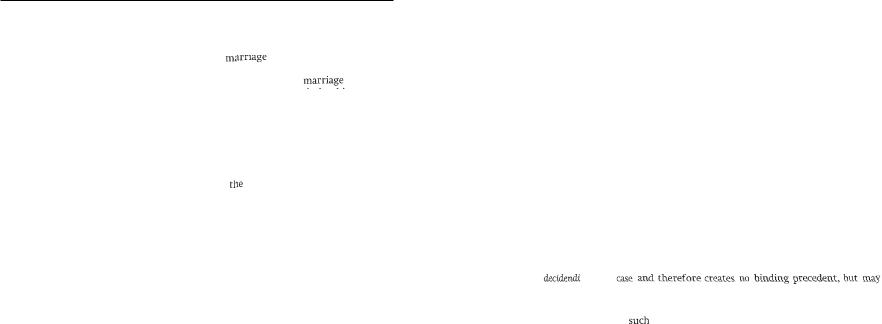
Elizabeth A Martin - Oxford Dictionary of Law, 5th Ed. (2003)
.pdf






opinio juris |
346 |
transaction; for example, the words "the Vendor hereby conveys Blackacre to the Purchaser in fee simple". No specific form of words is necessary provided that the intention is clear.
opinio juris [Latin, from opinio juris sive necessitatis (whether the opinion of law is compulsory)] An essential element of *custom, one of the four sources of *internationallaw as outlined in the Statute of the *lnternational Court of Justice. Opinio juris requires that custom should be regarded as state practice amounting to a legal obligation, which distinguishes it from mere usage.
opinion n. 1. A judgment by the House of Lords. 2. (counsel's opinion)A barrister's advice on a particular question. 3. Advice on a case given by an *Advocate General before a final judgment of the *European Court of Justice.
opinion evidence Evidence of the opinions or beliefs of a witness, as opposed to evidence of facts about which he can give admissible evidence. At common law, opinion evidence is in general inadmissible but this rule is subject to many exceptions. Thus a nonexpert witness may testify as to age, speed of vehicles, handwriting, or identity. Expert witnesses (e.g. doctors) may give their opinions on any matter falling within their expertise. At common law, a witness could not give his opinion on an ultimate issue (i.e. the question that the court had to decide) but this rule, which was not very strictly applied in practice, was relaxed in respect of civil cases by the Civil Evidence Act 1972.See also
option n. A right to do or not to do something, usually within a specified time. An enforceable option may be acquired by contract (i.e. for consideration) or by deed to accept or reject an *offer within a specified period. An option to acquire land or an interest in it on specified terms will only bind third parties if it is registered (see REGISTRATION OF ENCUMBRANCES). If an option to buy does not specify the price it will only be valid if it specifies a means for determining the price, e.g. by a valuation to be made by a specified third party who is or will be under a duty to act. Thus an option to buy at a price to be agreed is void for uncertainty.
On the London *Stock Exchange, options to sell or to buy quoted securities are purchased for a certain sum of money, which is forfeited if they are not taken up. An option to sell is known as a put option, that to buy is a call option, and an option to either sell or buy is a double option. Under the Companies Act 1985, directors, shadow directors, and the spouses or children of either are prohibited from buying or selling options in the shares of their own company.
optional clause A clause of the Statute of the *International Court of Justice (Article 36(2)) that gives states the opportunity of signing a declaration by WhICh they recognize as compulsory, in relation to any other state accepting the same obligation, the jurisdiction of the Court in all legal disputes concerning certain specified matters. Despite acceptance of the optional clause, it is common for states to append to their acceptance *reservations of their own making. These either concern specific topics that they will not allow the Court to settle or the reservations may, more sweepingly, exclude all matters that states consider to be within their domestic jurisdiction.
option to purchase A right to compel the owner of land to sell it to the option holder on agreed terms. The option constitutes an offer by its grantor that remains open in accordance with the terms of the option, enabling the grantee to accept it. This right binds third parties if entered as an *estate contract on the land charges register if the land is unregistered, or by the appropriate entry on the charges
register in registered land. See REGISTRATION OF ENCUMBRANCES.
347 |
origin system |
oral agreement A contract made by word of mouth, as opposed to one made in
writing. See also IMPLIED CONTRACT.
oral evidence Spoken evidence given by a witness in court, usually on *oath. A witness's evidence must usually relate what he knows through the use of his own senses. However, under the Civil Evidence Act 1995 *hearsay evidence in civil cases is now permitted.
orality n. The principle that evidence must be given orally and subject to *crossexamination unless *affidavit evidence is admissible.
order n. 1. A direction or command of a court. In this sense it is often used synonymously with *judgment. 2. The document bearing the seal of the court recording its judgment in a case. 3. A subdivision of the *Rules of the Supreme Court and the County Court Rules.
order for account An order in civil cases that the amount of money due from one party to another may be investigated. The order may be made before trial. Accounts are usually taken by a master or a referee and are most frequently ordered in partnership and trust matters.
order of discharge A court order resulting in the *discharge of a bankrupt.
Orders in Council Government orders of a legislative character made by the Crown and members of the Privy Council either under statutory powers conferred
on Her Majesty in Council (see DELEGATED LEGISLATION; STATUTORY INSTRUMENT) or in
exercise of the *royal prerogative. Com pare
Orders of Council Orders of a legislative nature made by the Privy Council under statutory powers conferred on the Council alone. They relate mainly to the regulation of certain professions and professional bodies. See DELEGATED LEGISLATION.
Compare ORDERS IN COUNCIL.
ordinance n. One of the forms taken by legislation under the *royal prerogative, normally legislation relating to UK dependencies.
ordinary resolution A decision reached by a simple majority (i.e. of more than 50%) of company members voting in person or by proxy. It is appropriate where no other type of resolution is expressly required by the Companies Acts or the *articles
of association. Compare EXTRAORDINARY RESOLUTION; SPECIAL RESOLUTION.
ordinary share See SHARE.
original evidence 1. Evidence of a statement made by a person other than the testifying witness, which is offered to prove that the statement was actually made rather than to prove its truth. Thus, if in an action for slander a witness testifies that he heard the defendant defame the claimant, his testimony is original evidence and not *hearsay evidence. 2. See DIRECT EVIDENCE.
originating summons A form of originating *process in the High Court now rendered obsolete by the Civil Procedure Rules. Under the Rules, it has been replaced by the *Part 8 claim form.
origin system A system for protecting products in which each is identified by means of an appellation of origin, which is similar to a trade mark but may only be used for a product from a particular region. The regulations, which cover many products, were agreed in March 1996.The scheme stops manufacturers, etc., from

p
P. Abbreviation for President (of the *Family Division of the High Court).
PACE Acronym for the Police and Criminal Evidence Act 1984.
pact n. See TREAIT.
pacta sunt servanda [Latin] Agreements are to be kept; treaties should be observed. Pacta sunt servandais the bedrock of the customary international law of treaties and, according to some authorities, the very foundation of international law.
.Without such an acceptance, treaties would become worthless.
pacta tertiis nee noeent nee prosunt [Latin] Treaties do not create either obligations or rights for third states without their consent.
paedophile n. A person who is sexually attracted to children (of either sex). Sexual activity with any children under the age of 16 is illegal. See also CHILD ABUSE; SEXUAL
OFFENCE.
paid-up capital The amount actually paid to a company for shares allotted or issued to a shareholder. If a shareholder makes a full payment of the purchase price of the share, the amount received is referred to as fully paid-up capital. If the company permits the shareholder to make only partial payment of the total purchase price, such shares are referred to as partly paid-up shares, with the remaining balance recorded in the company's accounts as an amount that the company may *call upon in the future (uncalled capital).
pain and suffering The psychological consequences of personal injuries, in terms of pain, shock, consciousness that one's life expectancy has been shortened, embarrassment caused by disfigurement, etc. Damages are assessed on the extent to which the claimant actually experiences these feelings.
palatine courts Originally, courts of the counties palatine of Durham, Lancaster, and Chester. In modern times, only the Chancery courts of Durham and Lancaster survived, but their jurisdiction was transferred to the High Court by the Courts Act
1971. See also VICE CHANCELLOR.
Panel on Takeovers and Mergers See CIIT CODE ON TAKEOVERS AND MERGERS.
paperless trading See ELECTRONIC DATA INTERCHANGE.
parallel import A product bought in one state and imported into another by the purchaser, often to take advantage of price differences between states; such products are also known as grey market goods. Parallel importation usually takes place outside supplier-authorized official distribution networks. Within the EU measures taken to prevent parallel imports in the Single Market will infringe *Article 81 of the Treaty of Rome (see EXPORT BANS). While it is permitted to restrict an exclusive distributor from soliciting sales outside his exclusive area, absolute territorial protection may not be given, either by contract terms or by conduct or oral arrangements.
paramount adj. (in land law) Superior; having or denoting a better right or title.
paramount clause See BILL OF LADING.
351 |
parental leave |
parcels pl. n. 1. Plots of land. 2. See DEED.
pardon n. The withdrawal of a sentence or punishment by the sovereign under the *prerogative of mercy. Once a pardon is granted, the accused cannot be tried and if he has already been convicted, he cannot be punished. The responsibility is upon him, however, to plead the pardon as a bar to prosecution or punishment; if he does not do so as soon as possible, he may be held to have waived it. A person may also be granted a reprieve, i.e. the temporary suspension of a punishment (for example, if he becomes insane after sentence is passed).
parent n. The mother or father of a child. The term also includes adoptive parents (see ADOPTION) but does not usually include *step-parents. At common law parents have parental rights over their children while they are minors, which include the right to physical control of the child, to control their education and determine their religion, to consent to medical treatment, to administer their property, to represent them in legal proceedings, and to discipline them reasonably. They also have parental duties, notably to maintain and educate their children, which can be legally enforced. Both parents exercise parental rights jointly, except in the case of illegitimate children, over whom the mother has exclusive parental rights unless the father has applied for *parental responsibility (he does, however, have a legal duty to maintain the child: see CHILD SUPPORT MAINTENANCE). Parental rights decline as the child grows older; in any dispute over their enforcement the *welfare of the child is
the paramount consideration. See also PARENTS' LIABILIIT; SECTION 8 ORDERS; SECTION 30
ORDER.
parental leave Time off work given to parents. The statutory provisions are contained in the Maternity and Parental Leave Regulations 1999, which set down key elements regarding such time off, although employers and employees are free to agree an improved contractual scheme.
In order to exercise the right to parental leave the employee must have been employed for a minimum of one year, must have or expect to have responsibility for the child, and must take any leave for the purpose of caring for the child. Up to 13 weeks' parental leave is available in respect of any individual child; it must be taken before the child is five years old. Adoptive leave (for employees who adopt a child) is available on the same basis, with the proviso that the leave must be taken within five years of the placement of the child (or before the child's 18th birthday, whichever is earlier). In the case of a disabled child, leave may be taken any time up to the child's 18th birthday; there are proposals to extend the period of this leave from 13 to 18 weeks.
In the absence of any contractual agreement on the operation of parental leave, the statutory provisions lay down default provisions. These state that leave must be taken in blocks of a week or more and that the maximum annual leave allowance is four weeks in respect of any individual child.
In order to exercise this right employees must give employers a minimum of 21 days' notice. Employers may postpone the leave but only if their business would be unduly disrupted. Fathers and prospective adoptive parents who want to guarantee that they can be present at the birth or placement of their child may book time off work without postponement. No notice is required to be given by employees returning to work, and on return employees are entitled to work in their same job.
Currently parental leave is unpaid, but this (and parental leave in general) is currently under review. However, from March 2003 working fathers are to receive the right to two weeks' paid paternity leave at the same flat rate as statutory maternity pay (see MATERNIIT RIGHTS). Proposals are also underway to introduce paid
